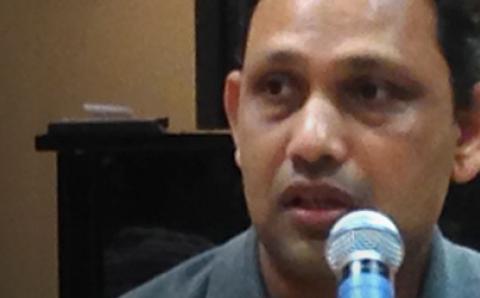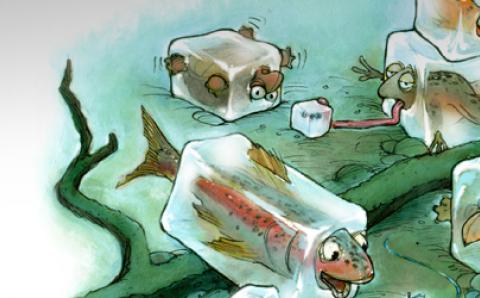“God was here before you missionaries came,” Steve Kabetu’s great-grandfather told missionaries who arrived in East Africa in the early 1900s. “What we didn’t know was that he had a Son.”
Today Kabetu serves as Canada director with Christian Reformed World Missions. His great-grandfather was one of the elders who welcomed British missionaries into their village in rural Kenya.
When the missionaries set up a school and asked the elders to send their children, Kabetu’s great-grandfather sent his youngest son, a boy who didn’t seem to be cut out for cattle herding. The boy excelled at school and soon was sent to England to study. Later, he returned to work with the missionaries in his home village, translating the Bible into the Kikuyu language. Years later, that man’s grandson is digging into how the churches that sent those missionaries also played a part in the colonization of indigenous peoples.
Despite his partnership with the missionaries, Kabetu’s grandfather and his people were eventually pushed onto reserves and required to carry passes and observe curfews. “My grandfather’s message until the day he died was, ‘Please distinguish between the white man who brought news of Jesus Christ and the white man who came to take your land,’” Kabetu said.
Unfortunately, bad theology was having an effect in Kenya and elsewhere. Formally expressed in a series of proclamations from the Pope when Columbus first landed in the Americas, the idea was that Christians were more fully human than “heathens” or “pagans.” Pagans could not hold title to land and had to be both civilized and evangelized. These proclamations, or papal bulls, are known as the Doctrine of Discovery.
“The Doctrine of Discovery came with entitlement—we own your way of life, all your systems,” said Kabetu.
Louis Leakey, the famous paleoanthropologist and archaeologist who grew up in the same village as Kabetu’s family, wrote a book about the life of the Kikuyu people before the arrival of the British, illustrating the complexity and sophistication of their social systems. But the British colonial government blocked the book’s publication for 40 years, said Kabetu. “The stated objective for their colonization efforts was based on the premise that the African needed to be ‘civilized,’ regardless of the fact that by that time several communities had been followers of Christ—some of them for decades.”
Kabetu is part of a task force that is studying the Doctrine of Discovery and the impact it has had on the Christian Reformed church’s approach to missions and on its members. His family’s story has echoes in North America. The reserves on poor land, pass systems, curfews, and government control are familiar to Indigenous people in North America. People such as Michelle Nieviadomy.
Nieviadomy remembers the shame she felt as a Cree child when her elementary school teacher spoke about Indigenous people. “It was hard to even acknowledge my identity,” she says. “One kid would make fun of me with Chinese jokes, and I remember thinking that at least it was better than Indian jokes.”
Nieviadomy is not alone in this experience. Now working with the Edmonton Native Healing Centre (ENHC), a Christian Reformed ministry in Edmonton, Alberta, she comes across people every day who are dealing with the effects of the Doctrine of Discovery and its dehumanizing theology.
She tells the story of an ENHC social worker who met an Indigenous woman in a park. “The woman had gone through unrelenting trauma and carried all this guilt and shame,” said Nieviadomy. When the social worker told her about residential schools and the years of difficulties her people had faced, it was like a burden was lifted. “She realized, ‘It’s not just me.’ It’s not about blaming anyone, but when you’re in a society that doesn’t treat you as equal, you can start to take it on.”
Nieviadomy grew up in a mostly white suburban neighborhood. Though her mother tried to connect her to her history and background, “I was stone cold,” she said. “I had zero desire to know about who I was as a Cree person.”
A pivotal moment came one day during history class at university while learning about the Doctrine of Discovery. “I started really dealing with my feelings about my identity and healing through music when I first started working at the Edmonton Native Healing Centre,” she said.
A few years ago, she hosted a night of music to share her journey from shame to pride in her Indigenous identity. Called “Moccasins in My Closet,” the event featured Nieviadomy’s original songs. One song in particular tells about the struggle and celebration of letting the things she had “hidden in the closet” into the light. “It was a kind of coming out event. There’s something beautiful in who we are.”
Nieviadomy said that Indigenous gifts and contributions are not valued as automatically as those of white people. “With Native teachers, and those of other races as well, there’s always the question, ‘Are they going to lead me the wrong way?’
“I want non-Native people to hear our story and not wonder if they can trust it.”
She is excited that the Christian Reformed Church is studying the Doctrine of Discovery. “It makes me feel that the CRC is going beyond talk to step into this history with us together,” she said. “This is not just Aboriginal history; it belongs to all of us.”
When she leads a group in the Blanket Exercise, an interactive exercise that walks participants through the history of the relationship between Indigenous peoples and other Canadians, she “sees light bulbs go off,” she said. “I think this process will create more of those light bulbs.”
In the United States, Susie Silversmith has been deeply impacted as well. At the age of 6, she was sent to Kinlichee Boarding School. The school was not far from her home in Ganado, Ariz., but might as well have been in another world.
“We were training like we were in the military, with strict rules and a lot of punishment,” Silversmith said. “This was to strip the Navajo out of me to become a ‘bilaaghiha,’” she said, using the Navajo word for “white man.”
Kinlichee was a very violent place, Silversmith said. One incident involving another student left her unconscious. But fighting back meant punishment. Sometimes students were ordered to kneel on the cement floor for hours, and Silversmith’s mouth was washed out with soap many times for speaking the Navajo language.
Loneliness plagued her during the nine years at boarding school. “Every time I had a chance I would go to the laundry room. It had a big window; if you sat at a certain place, you would see the road at the top of the mesa. Many times I longed for my parents to come get me.
“I was baptized many times with the Catholic, Presbyterian, Mormons, and other religious groups that came to the boarding school on Wednesdays and Sunday nights to teach religious instruction,” Silversmith recalled. “In the back of my mind, when I think of my parents, they had their own ways of praying for us in their own ceremonial and traditional Navajo ways. And I am thankful for that because there were a lot of bad things happening to us in boarding school.”
Despite this abuse, God reached Silversmith through a Navajo science teacher at her high school. “He would give me short verses to read,” she said. “At the end of the school year he asked me if I was ready to let Jesus come into my heart. My reply was yes because it was not beaten into me like in my earlier years. I wasn’t scared anymore. I am grateful to my Creator God; Jesus Christ, the Son of God; and the Holy Spirit, my helper.”
Talking about her years at boarding school is still hard for Silversmith. She is thankful for the way that God continues to heal and change her. One of her favorite Bible verses is 2 Corinthians 12:9: “But he said to me, ‘My grace is sufficient for you, for my power is made perfect in weakness.’”
“I am a walking miracle,” she said. “We are all Creator God’s children, no matter the color of our skin. We are created by him, and he loves each and every one of us.”
Doctrine of Discovery
The Doctrine of Discovery is a series of 15th-century papal declarations that gave European kings and their representatives the right to lay claim to any land that they “discovered,” giving theological and legal justification for colonization.
These declarations influenced the development of property law and policy toward Indigenous people in Canada and the United States.
“Theologically, the Doctrine of Discovery has been the handmaid to the idolatrous assumption that God’s presence has been confined to Western civilization—an idea that has all but destroyed the capacity of the major denominations to grow in Indigenous communities,” according to Rev. Mark MacDonald, National Indigenous Bishop of the Anglican Church of Canada.
Growing awareness of the long influence of the Doctrine of Discovery has led to a wide range of ecumenical and denominational studies.
Doctrine of Discovery Task Force
Born out of the Creation Stewardship Task Force at Synod 2012, the Doctrine of Discovery Task Force has been given the task of developing a shared understanding of the Doctrine of Discovery and its consequences for the Christian Reformed Church.
The task force will also encourage a learning process among CRC members and leaders. In particular, it is encouraging churches and classes to do the Blanket Exercise, an interactive history of the relationship between Indigenous peoples and settlers.
Chaired by Mike Hogeterp of the Christian Reformed Centre for Public Dialogue, the task force includes Indigenous people and members of other minority communities as well as academics and lay leaders. It will report to Synod 2016.
Please Pray
- May the Holy Spirit move powerfully to reconnect us and reconcile us as people sharing this land. Give thanks for the ways the Spirit is already at work, both visibly through activities such as the Blanket Exercise and invisibly, quietly changing peoples’ hearts.
- May God grant wisdom to the Doctrine of Discovery Task Force. May their work cultivate the shoots of reconciliation that have been growing.
- Give thanks for the Indigenous Family Centre’s 40th anniversary. Its work on the front lines of reconciliation in Winnipeg is a beautiful model of what can happen when we truly see the image of God in each other.
In My Closet
I feel lost in the world and I cannot define
How I got where I am and who am I now
What happened to me
Turned my world upside down, left me shaking inside
I look all around and I cannot decide
which way do I go
So confusion set in, I stumble around
Find my way but I’m blind
I just want to go home
But where did that go
Chorus
It’s a bit of mess in my closet
But I’m OK
I'm shedding some light oh here in the darkness
It’s a bit of mess but it’s alright
It’s the first time, it’s the first time I'm alive . . .
Years and years passed me by
I was barely alive, I was trying to survive
Trying to get back
I didn't know how to deal
I look left, I look right
I look deep down inside of my soul to unfold
But the memories run cold
I didn't want to feel . . .
About the Author
Danielle Rowaan is the CRC’s Justice Communication and Education coordinator.









